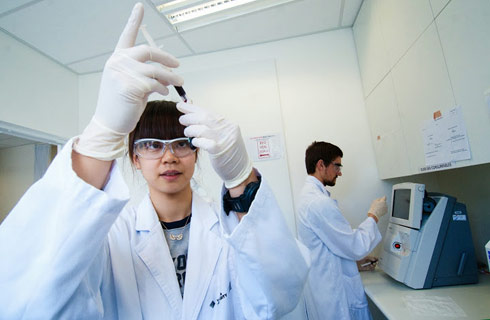BSc (Hons) Materials Chemistry

学历文凭
Bachelor Degree with Honours

专业院系
College of Science and Engineering

开学时间

课程时长

课程学费

国际学生入学条件
96-112 UCAS points
A Level: BBC
BTEC: DMM
IB - 112 tariff points - typically H5, H5, H6 at HL including HL Chemistry, Biology or Physics at 5
GCSE: Mathematics grade C or 4
Other Qualifications:
T level
Access to HE Diploma: The University welcomes applications from Access to Higher Education Diploma candidates for consideration. A typical offer may require you to obtain a proportion of Level 3 credits in relevant subjects at merit grade or above. A typical offer for stage 1 would be: Access to HE Diploma 45 at level 3 Credits with 18 credits at Distinction and 24 credits at Merit and contain at least 12 Level 3 credits in Chemistry. A science programme including Chemistry Level 3 credits would be required.
IDP—雅思考试联合主办方

雅思考试总分
- 雅思总分:
- 托福网考总分:
- 托福笔试总分:
- 其他语言考试:
CRICOS代码: F108
申请截止日期: 请与IDP联系 以获取详细信息。
课程简介
相关申请
 预科
预科 奖学金
奖学金 实习机会
实习机会 在校学习
在校学习 跨境学习
跨境学习 校园授课-线上开始
校园授课-线上开始 在线/远程学习
在线/远程学习
开学时间&学费
学费信息仅供参考,请与IDP联系以获取详细信息
| 开学时间 | 时长 | 学费 | 地点 |
|---|
学校排名

世界排名93
数据源:
泰晤士高等教育世界大学排名
关于格拉斯哥大学

格拉斯哥大学自1451年建校以来,始终致力于培养学生。该大学稳居全球百强大学之列,在2026年QS世界大学排名中位列第79位,在2025年泰晤士高等教育世界大学排名中位列第87位。2024年,格拉斯哥大学被《泰晤士报》和《星期日泰晤士报》优秀大学指南评为苏格兰年度大学。格拉斯哥大学是一所真正的国际化大学,拥有来自140多个国家的约43000名学生,并拥有超过9000名教职员工。它是英国顶尖研究型大学罗素集团的成员,也是Universitas 21(一个由全球研究型大学组成的网络)的创始成员。本科生可选择约100个单项荣誉学位和600多个联合荣誉学位组合。此外,大学还提供300多个授课型研究生课程和丰富的博士学位攻读机会。格拉斯哥大学毕业生就业能力位列英国前20名(QS毕业生就业能力排名,2022年),这意味着学生可以确信,他们的学位将为他们毕业后的生活做好准备。大学每年通过实习中心提供数百个实习机会,其强大的学生支持服务为学业、生活和财务方面提供帮助。格拉斯哥是英国第三大城市,被誉为全球友好且文化氛围浓厚的学生城市之一。格拉斯哥被誉为苏格兰的文化之都,拥有众多一流的博物馆、美术馆和建筑。格拉斯哥是英国第一个联合国教科文组织音乐之城,拥有 90 多个公园和花园、便利的交通和两座国际机场,为学习和旅游提供了理想的环境。
本校相关课程

动物学理学士(荣誉)
学历文凭
Bachelor Degree with Honours
开学日期
课程费用总额


BVMS兽医和外科
学历文凭
Bachelor Degree
开学日期
课程费用总额


理学士(荣誉)兽医生物科学
学历文凭
Bachelor Degree with Honours
开学日期
课程费用总额


BD(MIN)(荣誉)神学和宗教研究
学历文凭
Bachelor Degree with Honours
开学日期
课程费用总额


文学硕士(荣誉)戏剧研究
学历文凭
Bachelor Degree
开学日期
课程费用总额


BTechEd(荣誉)技术教育
学历文凭
Bachelor Degree with Honours
开学日期
课程费用总额

其他相关课程

PhD New Routes Towards Asymmetric Carbon Dioxide Incorporation for Organic Synthesis
 拉夫堡大学
拉夫堡大学泰晤士高等教育世界大学排名:316
学历文凭
Ph.D.
开学日期
课程费用总额


拥有一年工业或研究学士学位(荣誉)药物化学。
 雷丁大学
雷丁大学泰晤士高等教育世界大学排名:242
学历文凭
Bachelor Degree with Honours
开学日期
课程费用总额


化学科学硕士
 乐卓博大学
乐卓博大学泰晤士高等教育世界大学排名:267
学历文凭
Masters Degree (Coursework)
开学日期
课程费用总额


化学(具有工业培训年)MChem荣誉
 纽卡斯尔大学
纽卡斯尔大学泰晤士高等教育世界大学排名:144
学历文凭
Undergraduate Masters
开学日期
课程费用总额


博士化学(中国)
 利物浦大学
利物浦大学泰晤士高等教育世界大学排名:143
学历文凭
Ph.D.
开学日期
课程费用总额


PGCE and ProfGCE in Secondary Education Chemistry
 赫特福德大学
赫特福德大学泰晤士高等教育世界大学排名:765
学历文凭
Graduate Certificate
开学日期
课程费用总额










